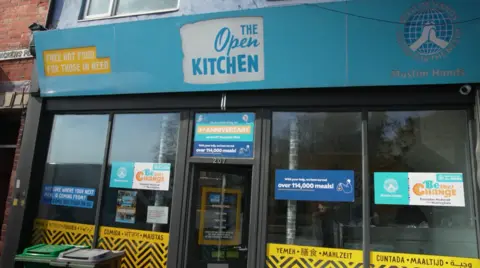BBC News, Nottingham
 Keith Williams
Keith Williams“If it wasn’t for food banks, I’d struggle to get any sort of food. I’d starve.”
Keith Williams says living on a monthly universal credit (UC) benefit payment of £368 is “a constant battle” and the money “just isn’t enough” and usually lasts about a week.
“Running out of food feels awful, you feel like you’re letting people down,” adds Keith, from Radford in Nottingham.
A spokesperson for the Department for Work and Pensions (DWP) outlined measures taken to support households on UC, including extending the Household Support Fund and child poverty taskforce.
UC is a single benefit payment for working-age people.
It was introduced to replace a range of different benefits for unemployed and low-paid people.
There were 7.9 million people on UC in June in England, Scotland and Wales, according to official government statistics, the highest level since its introduction in 2013.
‘I paid my taxes’
For Keith, he gets help at the non-profit charity SFiCE’s social cafe and food bank in Nottingham, which provides free meals to homeless and vulnerable people in the city.
The 42-year-old worked for 21 years before losing his last job in 2022 and has since struggled to find employment.
“After paying into the system for so long, Universal Credit feels like a slap in the face,” he added.
“People will say you should be happy because you’re getting money for nothing but I’m not, I paid taxes for 20 years, I deserve more.”
 John Lamb/Getty
John Lamb/GettyA UK-wide study by the University of Nottingham found that 70% of people on UC were skipping meals or going entire days without eating and losing weight.
Simon Welham, associate professor in human nutrition at the university, told the BBC that he originally began the study to understand what kinds of foods people on UC were eating and how much.
He realised the participants receiving benefits struggled to access proper nutrition, including consuming vitamins like vitamin A, iron, zinc, magnesium and selenium.
Of the participants in receipt of UC, 20% did not eat vegetables, he said.
“They couldn’t come close to achieving a normal standard of living,” said Mr Welham.
“We saw the kind of nutrient deficiencies that you see in developing countries and it seems this was driven solely by people’s financial capabilities,” he added.
Mr Welham said people on low incomes were often perceived to consume unhealthy foods at a higher rate but he “didn’t see that so much”.
However, he noticed those participants had an “over reliance” on staple foods like bread as they are “cheap and filling”.
“From the kind of things we’re seeing in our study and studies from across the country, I can’t see how anyone would willingly choose to be on Universal Credit,” Mr Welham said, addressing the stigma of benefit recipients.
 SFiCE
SFiCEAshley Hetfield, from Hyson Green, who also attends SFiCE’s weekly meal service, said relying on benefits had a detrimental effect on his mental health.
He said he had tried to stay positive and optimistic, but “living on a fifth of what [he] used to get when [he was] working” affected him.
“You can’t expect people to be able to live properly on £400 a month, if they’re paying energy bills, food and rent,” said Mr Hetfield.
The 34-year-old said that he usually ate at the social cafe, but in the past, he had gone without food “to protect [his] pride”.
“When you’re on Universal Credit, you have to become accustomed to living with nothing,” he added.

The Open Kitchen, another social cafe in Nottingham, said about a quarter of the people it saw each day received UC.
Cordinator Imran Khan said before the cost of living crisis, he used to only serve about 20 to 30 people a day.
Since April 2022, that number had increased to 120 to 130 people each day, he said.
“It’s not fair for anyone to go through something like this,” he added.
The standard UC allowance will be increasing by £7 a week in April 2026.
However, Mr Khan believes it is not enough to prevent the current level of food insecurity among people on UC.
“It’s not going to get anyone very far, is it?
“It’s nothing, half-way through the month people tell me, they’ve run out of food, gas and electric,” he added.
A spokesperson for the Department for Work and Pensions (DWP) said: “No-one should be living in poverty. That’s why we’ve extended the Household Support Fund and child poverty taskforce to support families and children.
“Alongside this, we’ve increased the National Living Wage and are helping over one million households by introducing a Fair Repayment Rate on Universal Credit deductions.”
Source link
 Unews World
Unews World

